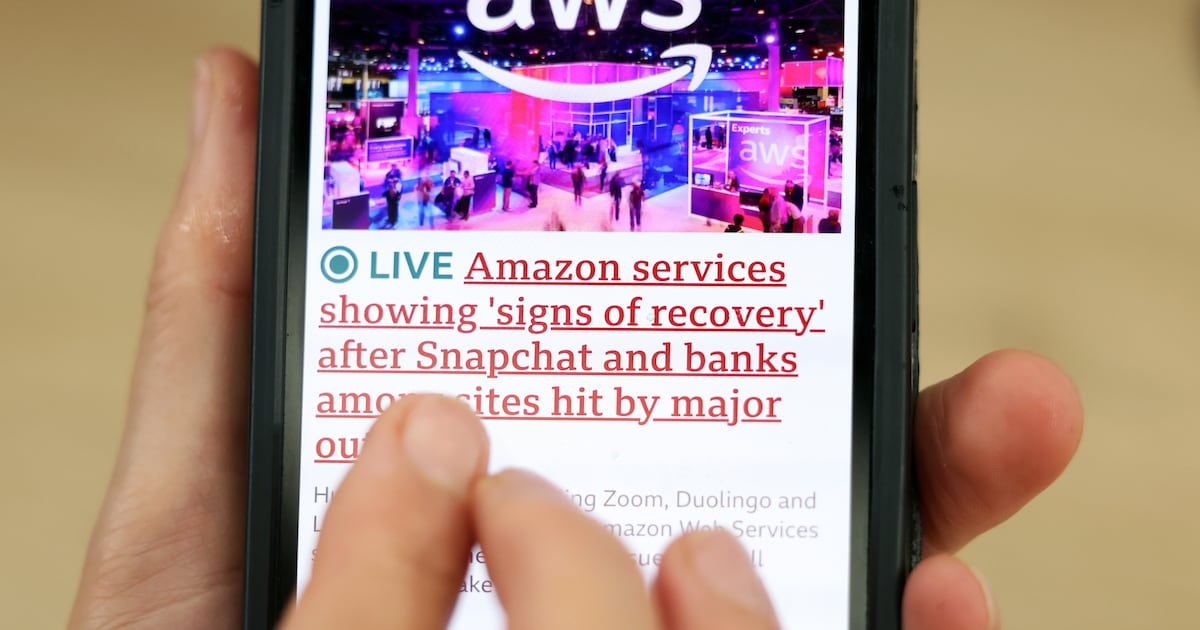The internet broke again but nobody seems to care.
On Monday morning, somewhere deep in the bowels of an Amazon Web Services data centre in northern Virginia, something happened that brought large swathes of the internet to a shuddering halt.
The shortlist of applications and services that stopped working or did not function properly included Snapchat, Reddit, Slack, Zoom and Venmo. Websites went down, flights were delayed and Amazon deliveries were also disrupted. It is estimated that 1,000 companies were affected by the outage, as were millions of users. The costs could run into the billions.
Amazon – along with Microsoft and Google – provides around two-thirds of the world’s cloud computing infrastructure, on which pretty much every web-based service now sits. Amazon is the largest, with roughly 37 per cent of the market. So when it has a problem, everybody has a problem.
You are unlikely to know what a fault with a domain name system update is – it was the cause of Monday’s outage – and you probably never will. But you do now know that the sort of connectivity that we take for granted is not something we should be taking for granted.
By late afternoon US time on Monday, AWS had fixed the problem. No aircraft fell from the skies and all the traffic lights in New York did not all go green at the same time. It could have been worse.
The public and corporate response to Monday can best be described as a global shrug of the shoulders. “Everyone has a bad day, today Amazon had a bad day,” was the view of Matthew Price, the chief executive of Cloudflare, one of Amazon’s smaller rivals.
He should know. A faulty update from CrowdStrike – one of his company’s strategic partners – caused 8.5 million devices running on Microsoft Windows to crash in July last year. The result was chaos across the globe that took 10 days to resolve.
Our collective insouciance about the vulnerability of the web to these sorts of events is perhaps not surprising given the regularity with which they occur; roughly every 12 months on average. Other significant outages include all of Meta’s data centres being disconnected in 2021 when someone apparently pressed the wrong button.
[ Amazon Web Services outage underlines vulnerability of web-based societyOpens in new window ]
The result was that Instagram, Facebook and WhatsApp went offline for the best part of seven hours. Some might argue this was a blessing, but not Meta shareholders, who saw $47 billion wiped off the company’s market capitalisation.
Google went dark for almost an hour in 2020 after a switch over to a new system went wrong. In 2021 Fastly, which provided content delivery for the BBC, Shopify, Amazon, CNN, and the US and UK governments was down for a similar period due to a faulty update.
The Earth did not stop spinning on any of these occasions and, given the sheer size of the infrastructure supporting the internet, they are incredibly rare. From this perspective, the inconvenience caused by the occasional outage is a price worth paying for the benefits offered by global connectivity. Hence our complacency.
You do have to wonder if this calculus will hold up in the brave new world of artificial intelligence. Its biggest proponents argue that it will run everything and do everything better than humans can.
By coincidence, the Wall Street Journal – whose website was reportedly affected by the AWS outage – ran a lengthy article on Monday describing the mania that seems to have gripped all the big technology players as they commit more and more money to build the infrastructure for a version of artificial intelligence that does not yet exist.
It is not just the big cloud computing companies such as AWS and Microsoft that have gone all-in on the vision peddled by Sam Altman, the messianic leader of OpenAI – the company behind ChatGPT – and others.
[ ChatGPT-5: Maybe Sam Altman should cool the jets on new AI iterationsOpens in new window ]
The world’s leading microchip makers and other hardware companies have bought into the notion that AI will do everything everywhere. They have committed to spending $1 trillion to provide the infrastructure that Altman says will be needed to achieve the goal of singularity – the moment when AI can achieve and exceed a human level of reasoning.
When put together with the investment planned by OpenAI’s rivals – Elon Musk’s xAI and Anthropic – the figures become meaningless, and unsurprisingly there is considerable concern that there is a bubble about to burst. The phrase “too big to fail” is being bandied about, which usually signals something is about to fail and get bailed out by taxpayers.
Absent from the debate seems to be any clear-eyed assessment of how the risks of the internet breaking will increase, as the points of potential failure grow exponentially. As will the consequences of an outage as AI gets deeply embedded into every aspect of our lives.
The glib answer is that AI will anticipate and solve this problem. Worth noting is that among the applications that went down on Monday was ChatGPT.

